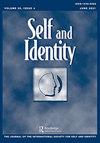自发自我肯定的个体差异预测幸福感
IF 2.1
4区 心理学
Q3 PSYCHOLOGY, SOCIAL
引用次数: 1
摘要
摘要本研究考察了人们在面对威胁(自发自我肯定)时报告自我肯定程度的个体差异与幸福感之间的关系。在三项研究中(总N=515),自发的自我肯定在横截面和纵向上始终是快乐和幸福结果的重要线性预测因子。自我肯定操作消除了两个幸福指数之间的联系,主要是通过提高自发自我肯定水平较低的人的幸福感得分。此外,自发的自我肯定被发现在一定程度上介导了社会经济地位和幸福感之间的联系。这些发现强调了自发自我肯定作为幸福感潜在重要贡献者的个体差异,并表明考虑自发自我肯定可能会进一步加深我们对社会经济地位和幸福感之间关系的理解。本文章由计算机程序翻译,如有差异,请以英文原文为准。
Individual differences in spontaneous self-affirmation predict well-being
ABSTRACT The present research examines the relationship between individual differences in the extent to which people report self-affirming when faced with a threat (spontaneous self-affirmation) and well-being. Across three studies (total N = 515), spontaneous self-affirmation consistently emerged as a significant linear predictor of hedonic and eudaimonic well-being outcomes, both cross-sectionally and longitudinally. A self-affirmation manipulation eliminated this association for two indices of well-being, primarily by boosting the well-being scores of those lower in spontaneous self-affirmation. Furthermore, spontaneous self-affirmation was found to partially mediate associations between socioeconomic status and well-being. These findings highlight individual differences in spontaneous self-affirmation as a potentially important contributor to well-being and suggest that consideration of spontaneous self-affirmation might further our understanding of the relationship between socioeconomic status and well-being.
求助全文
通过发布文献求助,成功后即可免费获取论文全文。
去求助
来源期刊

Self and Identity
PSYCHOLOGY, SOCIAL-
CiteScore
5.10
自引率
5.00%
发文量
26
期刊介绍:
Work on self and identity has a special place in the study of human nature, as self-concerns are arguably at the center of individuals" striving for well-being and for making sense of one"s life. Life goals develop and are influenced by one"s view of what one is like, the way one would ideally like to be (or would like to avoid being), as well as one"s perceptions of what is feasible. Furthermore, conceptions of self and the world affect how one"s progress towards these goals is monitored, evaluated, redirected, re-evaluated, and pursued again. Thus, the “self” as a construct has far-reaching implications for behavior, self-esteem, motivation, experience of emotions and the world more broadly, and hence for interpersonal relationships, society, and culture.
 求助内容:
求助内容: 应助结果提醒方式:
应助结果提醒方式:


